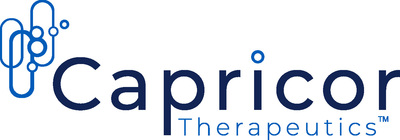

LOS ANGELES, Oct. 25, 2017 /PRNewswire/ -- Capricor Therapeutics, Inc. (NASDAQ: CAPR) today announced that the American Heart Association (AHA) Scientific Sessions 2017 has accepted for presentation at a late-breaking session the 12-month results from the company's HOPE-1 clinical trial of its lead investigational product, CAP-1002, in boys and young men in advanced stages of Duchenne muscular dystrophy.
Ronald G. Victor, M.D., associate director for clinical research at the Cedars-Sinai Heart Institute and an investigator for the HOPE-1 Trial, will present the results during a session entitled "Innovative Therapies and Novel Applications," which will begin at 9 a.m. on Nov. 15 at the Anaheim Convention Center.
HOPE-1 is a randomized Phase I/II 12-month clinical trial that evaluated a single dose of CAP-1002, a cell-based therapeutic candidate, in 25 boys and young men in advanced stages of Duchenne muscular dystrophy, a rare, life-threatening genetic disorder.
"We look forward to sharing these new data at one of the world's premier cardiovascular conferences and continuing our clinical development of CAP-1002 for the treatment of Duchenne muscular dystrophy," said Linda Marbán, Ph.D., Capricor president and CEO. "Subject to regulatory approval, we plan to initiate patient enrollment into the randomized, double-blind, placebo-controlled HOPE-2 clinical trial of intravenous, repeat-dose CAP-1002 in boys and young men with Duchenne muscular dystrophy in the first quarter of 2018."
Capricor previously reported that meaningful improvements in cardiac and skeletal muscle function were observed at a pre-specified six-month analysis of the HOPE-1 Trial. CAP-1002 is the company's lead investigational product and consists of allogeneic cardiosphere-derived cells, which improved muscle function and increased new muscle cell generation in preclinical models of Duchenne muscular dystrophy.
Duchenne muscular dystrophy is a devastating genetic disorder that causes muscle degeneration and leads to death, generally before the age of 30, most commonly from heart failure. It occurs in one in every 3,600 live male births across all races, cultures and countries. Duchenne muscular dystrophy afflicts approximately 15,000 to 20,000 boys and young men in the U.S. Treatment options are limited, and there is no cure.
Capricor is planning to host a conference call and webcast at 1:30 p.m. PT on Nov. 15th to review the 12-month HOPE-1 results. Access information will be provided on a press release that Capricor plans to issue earlier that day.
The HOPE-1 trial was funded in part by the California Institute for Regenerative Medicine.
About CAP-1002
CAP-1002 consists of allogeneic cardiosphere-derived cells, or CDCs, a unique population of cells that contains cardiac progenitor cells. CAP-1002 has been shown to exert potent immunomodulatory activity and stimulates cellular regeneration. CDCs have been the subject of over 100 peer-reviewed scientific publications and have been administered to approximately 140 human subjects across several clinical trials.
About Capricor Therapeutics
Capricor Therapeutics, Inc. (NASDAQ: CAPR) is a clinical-stage biotechnology company focused on the discovery, development and commercialization of first-in-class biological therapeutics for the treatment of rare disorders. Capricor's lead candidate, CAP-1002, is an "off-the-shelf" cardiac cell therapy that is currently in clinical development for the treatment of Duchenne muscular dystrophy. Capricor has also established itself as one of the leading companies investigating the field of extracellular vesicles and is exploring the potential of CAP-2003, a cell-free, exosome-based candidate, to treat a variety of disorders. For more information, visit www.capricor.com.
Cautionary Note Regarding Forward-Looking Statements
Statements in this press release regarding the efficacy, safety, and intended utilization of Capricor's product candidates; the initiation, conduct, size, timing and results of discovery efforts and clinical trials; the pace of enrollment of clinical trials; plans regarding regulatory filings, future research and clinical trials; regulatory developments involving products, including the ability to obtain regulatory approvals or otherwise bring products to market; plans regarding current and future collaborative activities and the ownership of commercial rights; scope, duration, validity and enforceability of intellectual property rights; future royalty streams, expectations with respect to the expected use of proceeds from the recently completed offerings and the anticipated effects of the offerings, and any other statements about Capricor's management team's future expectations, beliefs, goals, plans or prospects constitute forward-looking statements within the meaning of the Private Securities Litigation Reform Act of 1995. Any statements that are not statements of historical fact (including statements containing the words "believes," "plans," "could," "anticipates," "expects," "estimates," "should," "target," "will," "would" and similar expressions) should also be considered to be forward-looking statements. There are a number of important factors that could cause actual results or events to differ materially from those indicated by such forward-looking statements. More information about these and other risks that may impact Capricor's business is set forth in Capricor's Annual Report on Form 10-K for the year ended December 31, 2016 as filed with the Securities and Exchange Commission on March 16, 2017, in its Registration Statement on Form S-3, as filed with the Securities and Exchange Commission on September 28, 2015, together with the prospectus included therein and prospectus supplements thereto, and in its Quarterly Report on Form 10-Q for the quarter ended June 30, 2017, as filed with the Securities and Exchange Commission on August 14, 2017. All forward-looking statements in this press release are based on information available to Capricor as of the date hereof, and Capricor assumes no obligation to update these forward-looking statements.
CAP-1002 is an Investigational New Drug and is not approved for any indications. Capricor's exosomes technology, including CAP-2003, has not yet been approved for clinical investigation.
For more information, please contact:
AJ Bergmann, Vice President of Finance
+1-310-358-3200
abergmann@capricor.com

SOURCE Capricor Therapeutics, Inc.